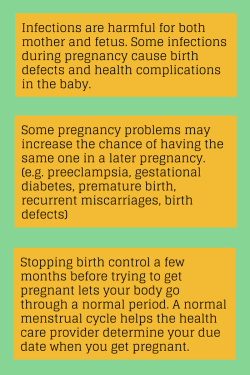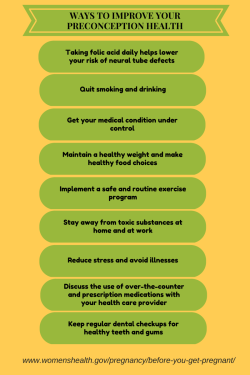Are you thinking about having a baby?
If the answer is yes, then start planning the right way! Taking care of your health is the start to a healthy pregnancy. Preconception care is your chance to address any medical problems you have or screen for potential risk factors that may affect your baby before getting pregnant. The baby’s major organs and body systems form in the first 8 weeks of pregnancy. Your physical and emotional health influences fetal growth and development. So don’t be afraid to schedule a preconception checkup with your physician.
What should you expect at your appointment?
The medical practitioner will ask you questions and discuss your health history:
- Reproductive – Periods, previous pregnancies, birth control, Pap smears, STD’s and vaginal infections affect a woman’s ability to conceive.
- Medical/Surgical – Medical issues like diabetes, asthma, hypertension, or thyroid disease can complicate your pregnancy. Reasons for surgeries, procedures, or hospitalizations can affect the management of your prenatal care.
- Medications – Some prescription and over-the-counter medicines, vitamins, supplements, or herbs could be harmful to the developing fetus or contraindicated in pregnancy.
- Family Health – The health history of you and your partner’s family helps the doctor screen for medical problems that could be inherited or often seen in certain ethnic groups. He/she may refer you to a genetic counselor who can discuss genetics, birth defects, or other medical conditions that run in families.
- Emotional and Social – Disclosing a history of mental health issues like depression, eating disorder, or domestic violence helps the practitioner give the appropriate referral for counseling.
- Lifestyle – The habits of you and your partner such as smoking, drinking alcohol, drug use, diet, exercise, stress, or caffeine consumption could affect fertility and/or pregnancy. Stopping harmful habits may reduce the risk of fetal complications and birth defects.
- Home and Workplace Environment – Possible hazards like exposure to X-rays, cat feces, mercury, lead or solvents are dangerous and affects your ability to conceive and maintain a healthy pregnancy.
What’s next?
- The doctor might perform a standard physical, especially a pelvic exam.
- Vital signs such as height and weight to calculate your BMI, blood pressure, and/or urine sample to screen for glucose and protein may be recorded.
- Your health care provider may order lab tests as indicated like rubella, hepatitis, RPR, HIV, CBC, Pap, or carrier screening for genetic diseases and other conditions.
- If you have a medical condition such as diabetes, thyroid disease, hypertension, or asthma, the practitioner may refer you to a specialist for management.
- He/she will discuss your menstrual cycle to determine the time you are more likely to get pregnant.
- The physician will prescribe a prenatal vitamin with folic acid.
- He/she may suggest lifestyle changes like weight loss for obesity or increasing caloric intake for being underweight, quit smoking or drinking, stop medications that are harmful to the baby, updating your immunizations, and avoiding stress.
Women should be healthier before conceiving to prevent problems that could affect the pregnancy and the baby later. The preconception visit with your medical provider is a great opportunity to learn about your health and the right steps to plan for a healthy pregnancy.
For more information, here are some helpful sites about preconception care. Good Luck!
acog.org – Good health before pregnancy FAQ pdf
marchofdimes.org – Your checkup before pregnancy
marchofdimes.org – Family health history form
womenshealth.gov – Preconception care
babycenter.com – Preconception checklist
Resources:
- ACOG – The American Congress of Obstetricians and Gynecologists
- March of Dimes
- Baby Center Expert Advice
- Office on Women’s Health, US Department of Health and Human Services
- Cleveland Clinic
- AAFP – American Academy of Family Physicians




